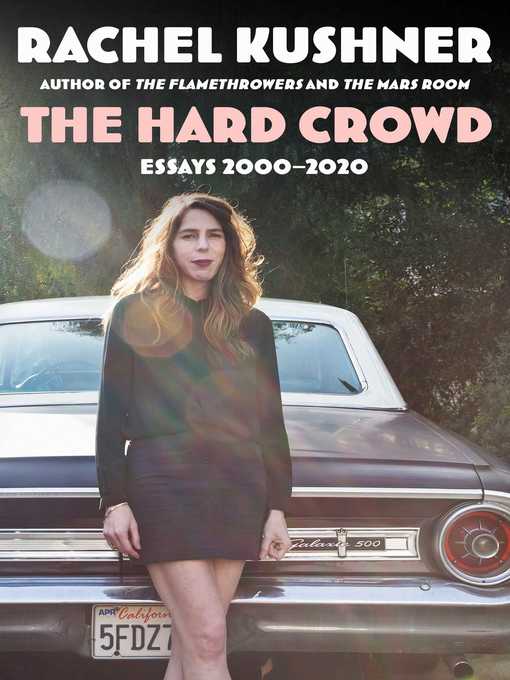
The Hard Crowd
Essays 2000-2020
کتاب های مرتبط
- اطلاعات
- نقد و بررسی
- دیدگاه کاربران
نقد و بررسی

December 21, 2020
Character sketches and nostalgic detail pepper this wide-ranging essay collection from Kushner (The Mars Room). Blending criticism with memoir, Kushner tackles such subjects as abolitionism and the Bay Area’s biker scene in the 1980s. “Girl on a Motorcycle” and “Not with the Band” trace the author’s exposure to “hard” lifestyles, including surviving a high-speed motorcycle crash in Mexico and, while working as a bartender in San Francisco, realizing that mere proximity to rock fame would never satisfy her own creative ambition. “We Are Orphans Here” is a striking account of both the violence and the vitality of Shuafat Refugee Camp, where Palestinians live as “refugees in their own city.” “Lipstick Traces” and “Duras with an S” bring the work of Clarice Lispector and Marguerite Duras to life with vivid biographical details (Lispector had “a sense of humor that veered from naïf wonder to wicked comedy”), while “Made to Burn” and “Bunny” offer glimpses into the genesis of Kushner’s 2013 novel The Flamethrowers. The memoir essays sometimes settle for simple nostalgia rather than arriving at a revelation, a dilemma Kushner seems aware of: “The things that I’ve seen and the people I’ve known: maybe it just can’t matter to you.” Still, the author’s fans will enjoy these insights into her evolution as a writer.

February 15, 2021
The acclaimed novelist offers 20 years of entertaining essays on topics ranging from motorcycles and flying cars to Italian cinema and The Love Boat. "To be hard is to let things roll off you, to live in the present, to not dwell or worry," writes Kushner in the philosophical title piece. As she admits, those likely aren't qualities a writer possesses. The essays serve as testaments to the author's talent for marshaling her softness into a curiosity that allows her to write capably on a variety of subjects. These include the exceptional opening essay, on her participation in the annual Cabo 1000 motorcycle race in Baja California; her account of a visit to a Palestinian refugee camp; an essay about an Italian cruise ship that crashed in 2012 and the subsequent disgrace of the captain who abandoned his passengers; and that title essay, in which she muses that much of life is "living intensely in the present" until one's later years, when a person will "turn reflective, interior, to examine and sort and tally"--which Kushner, who is in her early 50s, does by recounting episodes from her youth in San Francisco. A few of these pieces would have benefited from more reflection. Essays on a Bay Area concert promoter she worked for or a Dartmouth friend of her father's who went to Paris "chasing European bohemia" are loosely focused reminiscences that don't reach the depth of the others. Still, the best essays are superb: excellent works of literary criticism on Denis Johnson, Marguerite Duras, and Clarice Lispector; a revealing examination of the filmmakers and images that influenced her novel The Flamethrowers, a finalist for the National Book Award; and a perceptive work about the artist Jeff Koons, whom she calls, in a slyly cutting phrase, "a showman and salesman, keeping the dream of American entrepreneurial success alive." Fascinating insight into the development of an inquisitive, probing authorial mind.
COPYRIGHT(2021) Kirkus Reviews, ALL RIGHTS RESERVED.

April 1, 2021
Best-selling novelist Kushner (The Flamethrowers) turns to essays and criticism in this volume, though readers of her fiction will recognize her themes. Many of the pieces in this collection are memorable portraits of artists, writers, and musicians (including Jeff Koons and Marguerite Duras) that emphasize their eccentricities, charisma, and legacies. Kushner's own voice is always present, but those essays that most directly address her personal experiences feel the most alive. Kushner shares her stories in a way that manages to be personal but not self-serving. In one, she crashes in a motorcycle race, and in another she visits a Palestinian refugee camp. Fans of '90s music will find her narrative of working at San Francisco's Warfield and Fillmore Theaters especially captivating. The final essay is also a standout, full of reflections on Kushner's upbringing in San Francisco and the people and changes she encountered there. VERDICT There is a great deal of variety and personality in this essay collection, especially for readers with an eye for art, music, and literature. Those who enjoy Kushner's novels will gravitate to this collection, and readers new to the author's writing will be drawn in as well.--Sarah Schroeder, Univ. of Washington Bothell
Copyright 2021 Library Journal, LLC Used with permission.

April 1, 2021
Readers of Kushner's high-voltage novels, including The Mars Room (2018), can't help but wonder about the source of her far-roaming and omnivorous imagination. Much is revealed in this vitalizing essay collection. Kushner's autobiographical pieces illuminate complicated aspects of her adventurous life and why and how she developed the skills to write about it with such breath-catching clarity and polished rigor, the literary equivalent of the fine-tuned mechanics of the motorcycles and classic cars she treasures. Here are riveting accounts of her part in a madly dangerous motorcycle race down the Baja Peninsula, and her late-1990s cross-country odyssey in a 1963 Chevrolet Impala. Risks of a different sort are cataloged in tales of Kushner's rough San Francisco youth and bartending stints in music venues. Kushner is also an astute and vigorous literary essayist, parsing with distinct insights works by Marguerite Duras, Denis Johnson, and Clarice Lispector. She also incisively profiles artists and visionary prison abolitionist Ruth Wilson Gilmore. The child of educated nonconformists, Kushner ran with a "hard crowd"--a term lifted from the Cream song "White Room"--managing to survive, she muses, as the "soft one," the one "who lived to tell." And tell she does, steering her way through perilous curves with steely agility and purpose, leaving her passengers exultant and enlightened.
COPYRIGHT(2021) Booklist, ALL RIGHTS RESERVED.

























دیدگاه کاربران